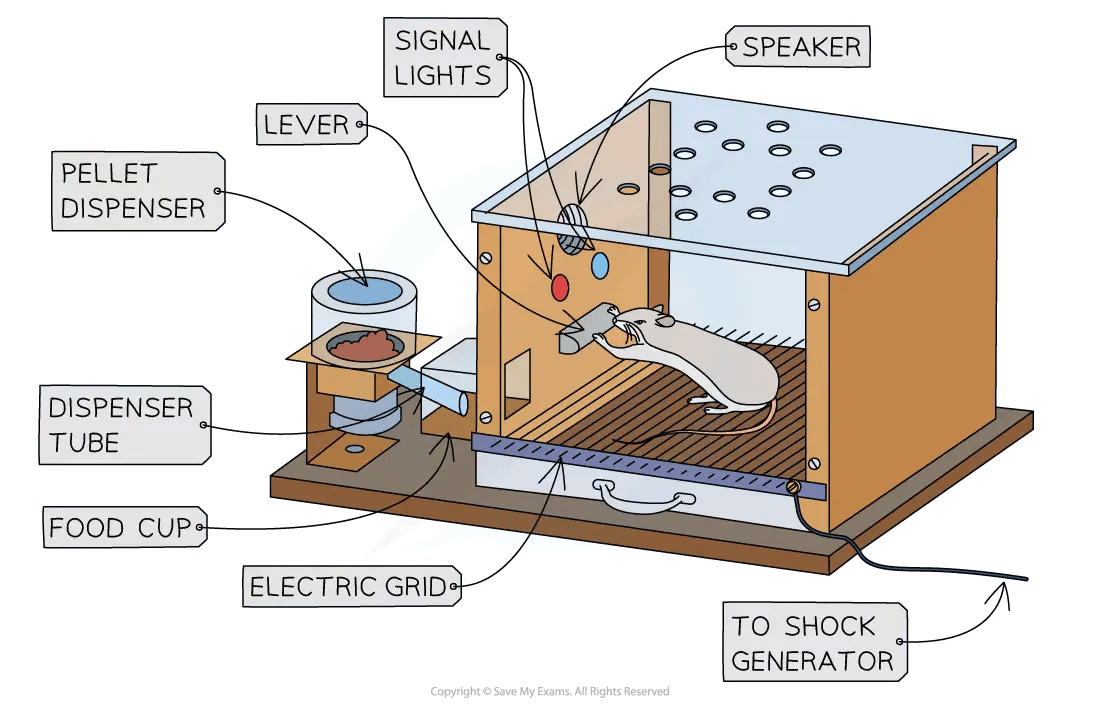Syllabus Edition
First teaching 2025
First exams 2027
Operant Conditioning & Major Depressive Disorder (DP IB Psychology): Revision Note
Operant conditioning & MDD
Operant conditioning (OC) is learning through consequences
Behaviour is shaped by reinforcement (which encourages repetition) and punishment (which discourages repetition)
Learning is an active process as humans and animals operate on their environment and learn from outcomes (Skinner, 1953)
Types of reinforcement & punishment
According to Skinner, consequences are learned via three types of direct reinforcement:
Positive reinforcement – behaviour repeated to gain pleasant consequences or rewards
E.g., doing homework to get praise
Negative reinforcement – behaviour repeated to avoid unpleasant consequences
E.g., doing homework to avoid detention
Punishment decreases behaviour
Positive punishment = unpleasant outcome (e.g., being told off)
Negative punishment = loss of something pleasant (e.g., not being allowed to go to a party)
Skinner's research (1953)
B.F. Skinner (1953) conducted experiments to investigate how animals learn from the consequences of their actions
He used the Skinner Box, placing one rat at a time inside
The box contained:
A lever that released food as a reward
An electroplated floor that delivered mild electric shocks as punishment
Key findings
Positive reinforcement:
A hungry rat accidentally pressed the lever – a food pellet was released
The consequence was that the rat quickly learned to press the lever repeatedly, as the behaviour was reinforced by the reward
Negative reinforcement:
The rat received an unpleasant electric shock
When the rat accidently pressed the lever, the electric shock stopped
The consequence was that the rat learned to press the lever immediately when placed in the box to remove the unpleasant stimulus
Avoidance learning:
A light signalled that a shock was about to happen
The rat learned to avoid the electric shock by pressing the lever when the light came on

Link to MDD
Operant conditioning can help explain how depressive behaviours are learned and maintained:
Lack of positive reinforcement (reduced social praise/attention) may reduce motivation and lead to withdrawal
Negative reinforcement may maintain depressive behaviours (avoiding social situations reduces anxiety but reinforces isolation)
This shows how environment and consequences can contribute to the onset and persistence of MDD symptoms
Research support for operant conditioning & MDD
Lewinsohn et al. (2006)
Aim:
To compare the amount of positive reinforcement received by patients with MDD and non-depressed participants
Participants:
30 patients with MDD
A group with another disorder that wasn't depression
A control group with no MDD
This was a quasi-experiment
Procedure:
Participants were asked to complete questionnaires daily over a 30 days
They rated themselves on a daily mood checklist (e.g., 'I feel happy/miserable/dull')
They completed a pleasant activities schedule (320 activities, e.g., sport, meditation, reading, socialising)
Each activity was rated for enjoyment and repetition on a scale of 0-3
Positive reinforcement was operationalised in terms of activities that were both enjoyed and repeated
Results:
Positive correlations were found between pleasant activities and good mood
The more pleasant activities a participant was involved in, the higher their mood rating
Conclusion:
Positive reinforcement from enjoyable activities may help maintain a good mood and protect against MDD
Evaluation of operant conditioning & MDD
Strengths
The above research uses standardised procedures, which gives it reliability, and it also draws from participants’ daily activities, so it has good ecological validity
Reinforcement is already successfully applied in token economies (e.g., for schizophrenia), supporting its use in treating mental illness
Limitations
OC cannot explain why some people continue to engage in harmful behaviours
E.g., someone with MDD may persist in self-blame or substance abuse that brings no positive reinforcement
OC is based on Skinner's animal research, which is environmentally reductionist
Humans are much more complex and sophisticated than animals and operate at a higher cognitive level
Link to concepts
Causality
Operant conditioning uses the mechanisms of scientific inquiry to investigate behaviour (standardised procedures, objectivity, only observable behaviours are measured)
It strives for a cause-effect solution to explain specific behaviours
A problem with this is that human behaviour is more nuanced and difficult to pin down to one discernible cause than, say, a rat pressing a lever for food
Perspective
Environmental reductionism is the idea that a complex disorder such as MDD can be explained simply by framing it within the context of reward-seeking/punishment-avoiding behaviours
There is compelling evidence to suggest that MDD may have a biological basis (neurochemical) and/or be the result of faulty schemas (cognitive) so it cannot be viewed in isolation as the result of one environmental influence

Unlock more, it's free!
Was this revision note helpful?
